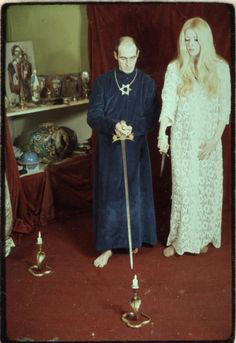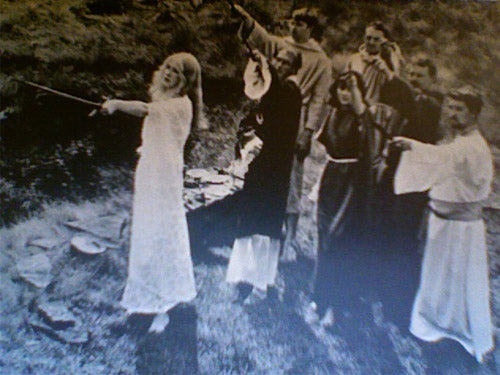You have no items in your shopping cart.
Maxine Sanders
Although the Witches’ Almanac staff normally conducts our interviews, this year, we had the exciting opportunity to have David Conway interview Maxine Sanders for us. Since they have been friends for many years, this interview provides us with a unique display of conversation that could not be had between strangers. Thank you, David, and thank you, Maxine.
Much has changed since we both set out on our magical path in the nineteen-seventies. (Was it really more than forty years ago?) In those days magic was a minority interest. Nowadays one can’t move without bumping into somebody who’s into it. As for Witchcraft and Neo-Paganism there seem to exist, at least to an outsider like me, more varieties on offer than Mr. Heinz’s famous 57! Remind me what things were like when you started forth.
In the 1960s there were far fewer covens. And of course secrecy was routinely observed so even those that existed contrived not to draw attention to themselves. This made sense as public attitudes to witchcraft were less tolerant than today. Most people knew about it only from what they’d read in the popular press. And journalists were only too happy to pander to their readers’ fascination with sex and debauchery.
Indeed. As a small boy I remember seeing newspaper pictures of Gerald Gardner and two younger companions with their kit off. I seem to remember that Doreen Valiente fell out with him about so much, er, public exposure. She favoured discretion.
So did many of us. Our workings were simple, our trust in the magic unflinching, while our devotion to the Old Gods permitted no compromise. Like others I’d have been willing to die for the Craft and our right to practise it.
And Alex?
His devotion, too, was beyond question. But Alex was a complex, at times enigmatic, person. Today the word “charismatic” is used willy-nilly but I believe Alex was precisely that. He had about him — and no one knew it better than he — a quality, a kind of personal magnetism that drew people to him, foremost among them, of course, those eager to learn about witchcraft. Sadly, this same quality also had its downside. It’s not that it went to his head, much as he relished the attention, but it did sometimes impair his judgement. This happened when the press got wind of him and sought to know more about what he was up to. And he, generous to a fault, talked to them freely. The consequent publicity was not a great experience — here I understand Doreen’s exasperation with Gardner — but Alex, bless him, thrived on it. No one relished media attention more than he did.
I’ve always supposed that what Alex set out to do was devise an alternative to the system which, whatever its claims to antiquity, had to by and large been the invention of Gerald Gardner. Well of him and Doreen (whose contribution is sometimes overlooked.) I have a vague notion of what Alex did differently but perhaps you can remind me
I’ll try. I must confess, however, that only recently have I got to know better the ways and workings of the Gardnerians. For a long time traditions other than our own — and there are of course several — never interested me greatly. But from what I’ve learned, it seems that some fundamental differences, both of emphasis and practice, do indeed exist.
One point worth making is that Alex recognised from the start that freedom, something he passionately believed in, depends always on choice. And for him the moment choice is withdrawn then freedom, too, goes with it. Such was his high regard for freedom that he sought never to compromise, let alone deny, an individual’s right to choose to believe or to do this or that. Imposing his own preferences was not his way at all. I gather, however, that a similar respect for choice is not the case elsewhere.
Another difference concerns the practice of scourging. In our tradition, scourging takes place during Initiation and in certain other workings but never with any intention of causing pain or harm. Indeed, it was to discourage sado-masochists — that Alex replaced the scourging thongs with silk ones.
After Initiation, nudity in Alexandrian craft becomes a matter of choice on all but a few occasions when certain types of magic are worked. (It’s often more convenient, if nothing else, to be naked!) Offering a choice contradicts, so far as I understand it, the instruction in Doreen Valiente’s version of the Charge. Yes, we do practise nudity but, as I said, for us it’s usually a matter of choice not compulsion
Our priority is to work magic. To that end our efforts are directed to attaining the shift in consciousness which allows one to experience — the numinous reality behind matter and form. It demands effort, hence our emphasis on training and self-discipline. We have a saying ‘out of the worship comes the magic’ and for us the worship that generates magic requires long, even arduous, practice. For that reason Alexandrians expect both self-discipline and sustained effort of their coven members.
We Alexandrians focus on the priesthood, on spirituality and on magic. Our joy — since we’re not at all a gloomy bunch — comes first and foremost from the magic. (And yes, because we’re only human, I must admit we sometimes stir the cauldron in more ways than one!) In addition we also go in for rather jolly Grand Sabbats, though the jollity doesn’t compromise the more serious business of raising power or exploring together the theology and practice of Witchcraft.
What are relations like today between the Gardnerians and the Alexandrians? Do I discern a more ecumenical spirit than before, or are they still at loggerheads?
Nowadays the different traditions get on well enough. And so they should. That said there’s a growing tendency to believe that initiation into the Craft means acceptance within a ‘community,’ one whose parts are all much of a muchness. Talk like that reminds me of the touchy-feely ecumenism popular among Christian denominations. Let’s all be friends, certainly, but let’s not pretend we’re all one big happy-clappy family. I didn’t seek Initiation with a view to joining a band of fellow pilgrims, still less to improving my social life or adding names to my address book. My work as a priestess demands a lot of time and effort. It gives me little chance, even if I wanted it, to dally with people — mere hobbyists, some of them — who like to meet and talk about witchcraft. Good luck to them but, please, count me out.
My impression — and I speak as an outsider — is that not all is love and light among the Alexandrians themselves. Indeed, I see that you yourself have come in for a lot of stick lately. What’s that been all about?
The Alexandrian tradition rapidly fell victim to its own success. In no time at all we were inundated with requests for Initiation. And Alex, most generous but least discerning (let alone judgmental) of men, would say “Who am I to refuse?”, then set about initiating all and too often, sundry. It turned out to be a mistake. The consequence has been too many Initiates and too few teachers. Well, too few wise teachers, certainly.
One consequence of poor teaching has been a shift in emphasis from what I regard as essential — the Coven and its work — to the wider movement as such. A proliferation of social get-togethers, meetings and too many moots has, I feel, made the Craft mundane, quasi-secular and something it should never be — downright boring! Worse, these moots are often a device to win converts, something that has always been a no-no in the Craft. Better a few good and capable witches than a crowd who are neither. Too often today, I fear, the Craft is ill served by people whose ambitions are more mundane than magical, as well as by ill-informed teachers and, a new but noisy breed, the academically minded.
I am known, perhaps notorious, for saying what I mean. (And, I hope, for never saying what I don’t.) I’d never question the right of others to disagree with me but disagreements should relate to matters of substance, not to the person whose views one disagrees with. Name-calling belongs to the playground, not to the Craft.
Hang on, you sound as if this is something you feel strongly about, something that’s affected you personally
It has. I expect my views to be challenged and make no claim to infallibility, but I'm saddened by the vituperation — it’s not too strong a word — directed at me every now and then. And this just because my opinions chance to differ from those of my detractors. Not even someone as thick-skinned as I am can avoid being hurt from time to time. Hurt and disappointed. I don’t want to cite examples — they’re already out in the public domain — but I maintain that nothing is accomplished by attacking the singer because you happen not to like the song.
What saddens me — and again I speak as an outsider — is that thanks to the Internet, differences are nowadays paraded like trophies, with little willingness to compromise or seek common ground. Of course there may sometimes be no common ground but in that case, one might hope for agreement to disagree. Without rancour or ill-feeling. Anyway before we stop and have a cup of tea — the brickies sort for you, I remember — let’s hear a little more about the Alexandrian Craft. Tell me in a few words about its belief and practice.
Alexandrian Craft differs from other Traditions in several ways. We don’t for instance keep the measure, taken at the 1st degree Initiation, while 2nd and 3rd degrees are given together. The 1st degree involves admission into the Mysteries, the 2nd penetration of the Mysteries and the 3rd their celebration. We do not use the scourge except at Initiation and as part of certain magical workings. Neither, as I pointed out, do we insist on nakedness other than at Initiation, while we seldom re-enact the mysteries, opting instead for direct access to them through magical workings. At all times Alexandrian initiates are free to come and go as their conscience dictates, although commitment and self-discipline are expected while they remain.
As for our Witch Queens, these retire in their late twenties, usually around twenty-eight. This is unrelated to notions of fertility, as might have been the case in ancient times, but to the fact that the priestess will by then have acquired a certain amount of knowledge, both occult and mundane, and with it the “tarnish” of ego. In other words, she has progressed to the Mother aspect and begun the process of nurturing the Child of Promise within her. No longer is she the Virgo Immaculata, the pure, untouched Maiden. That said, not all of today’s groups observe this practice. On the contrary, human vanity being what it is, some Witch Queens hold on to the title for dear life.
Another characteristic of our Tradition is that we do not re-initiate unless the person applying to join our circle feels the need for it. We also insist on a ‘no socialising rule’ until candidates become Elders or gain access to the higher degrees. It has often struck me that if all Alexandrians stuck to this rule, much of the squabbling and rancour I discern nowadays would not have arisen. Which leads me to add that good manners, the outward sign of respect for others, are for me a requirement of all occultists. Equally important is the absence of mystery-mongering. Rarely will you hear an Alexandrian say “I can’t tell you that because of my oath”. No, mysteries are judiciously revealed to those who crave to understand.
One comfort, I suppose, is that disagreements, however unwelcome, are a sign of life, even vigour.
Since the nineteen-sixties when Alex burst onto to the scene, upsetting the elite — and elitist — high priesthood, Witchcraft of every hue has thrived. To this we owe in large part the rebirth of paganism, and the various groups that comprise it. To many it has brought immense joy and the freedom to worship in a way of their choosing, unfettered by the dogmas and moral strictures of orthodox religion.
Today I’m delighted that within contemporary Witchcraft, there seems agreement that good teachers are essential to its long-term survival. And the need for them is finally being met. It’s been said that with maturity comes discernment. That, too, is now in evidence. Thanks to it, useless elements —embellishments that never lived up to their promise—are being seen for what they are and discarded. The Circle of the Wise has regained a wisdom it was at grave risk of losing.
Witchcraft is, as it was from the beginning, a vocation. If there’s one lesson to be learned, it is that while many feel called, few, as the parable says, are fortunate enough to be chosen. The Craft is not elitist but being part of it requires qualities and commitment of a special kind. That’s why it differs from the larger Pagan community, while still, as I’m the first to acknowledge, being a part of it. The truth remains, however, that attempts to make the Craft accessible to all—and we live in an egalitarian age—dilute the qualities that make and have always made Witchcraft not just special but magical as well
You sound optimistic about the future.
I’m confident that good manners, imagination and effective magical practice will ensure the future of the Craft. That said, each whole is only as good as its parts. Which is why I remain persuaded that the future of the Craft depends not on the wider community but on the work and commitment of those individual circles that comprise it. It’s a case of small is beautiful. And enduring.
Well, we’ve come a long way, the pair of us, from the Notting Hill Gate of the nineteen-seventies, you and Alex in Clanricarde Gardens and me, still a penniless student, around the corner in Portobello Road. We didn’t know each other then, though we’ve worked out that we patronised the same launderette. (The machines, I remember, were pink and the dryer temperamental.) Oh dear, our youth has long gone. At least the magic stayed on.
Oh yes, I remember the launderette and the wonderful lady who ran it. We used regularly to chat about the world and its woes, or rather, how to right them. And all that while folding a pile of sweet-smelling freshly washed nappies.
As you say, the magic stayed. The two of us are still around to prove it!











